|
|
|
Sort Order |
|
|
|
Items / Page
|
|
|
|
|
|
|
| Srl | Item |
| 1 |
ID:
124297


|
|
|
|
|
| Publication |
2013.
|
| Summary/Abstract |
From the turn of the century up until the 1930s, public education under Dutch rule in Indonesia developed both quantitatively and qualitatively, but this expansion was interrupted, and even reversed, by the onset of the Great Depression. Focusing on schoolteachers in particular, this essay examines the trajectory of education policies in colonial Indonesia in response to the crisis, from the initial measures, to partial recovery in the mid-1930s, up to the Japanese invasion of 1942. The crisis ushered in the policy of indigenisation, which saw large-scale education reorganisation, including the substitution of European teachers with much lower paid Indonesians. Indigenisation was also a political response to the spreading of nationalist ideals through the growing number of independent schools run by Taman Siswa and the Muhammadiyah. Hence, the intention was also to transform Indonesian teachers into cultural agents who would propagate a government-formulated concept of cultural identity among their own community. However, indigenisation contributed to the gradual delegitimisation of colonial authority through the exodus of well-educated Indonesians who had been intended as docile imperial subjects.
|
|
|
|
|
|
|
|
|
|
|
|
|
|
|
|
| 2 |
ID:
124292


|
|
|
|
|
| Publication |
2013.
|
| Summary/Abstract |
For contemporary Malay/Indonesian speakers, dukun signifies an indigenous healer. Etymologically, however, the word dukun is not native to Malay/Indonesian. Some say dukun is Arabic, but this article claims it is more Persian than Arabic. When fifteenth-century Persian settlers brought the proto-form of the word dukun to the Malay Archipelago, they also brought cosmopolitan notions of Sufism, faith and healing. Eventually orthodox Arab immigrants and Europeans denigrated Sufi healers as 'indigenous'. Dukun became a rhetorical foil demonstrating how superb Western physicians or orthodox Arabs were by comparison. Gradually, the dukun's reputation became intertwined with negative attitudes about 'indigenous' practices.
|
|
|
|
|
|
|
|
|
|
|
|
|
|
|
|
| 3 |
ID:
124298
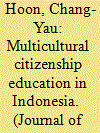

|
|
|
|
|
| Publication |
2013.
|
| Summary/Abstract |
This study investigates how multicultural citizenship education is taught in a Chinese Christian school in Jakarta, where multiculturalism is not a natural experience. Schoolyard ethnographic research was deployed to explore the reality of a 'double minority' - Chinese Christians - and how the citizenship of this marginal group is constructed and contested in national, school, and familial discourses. The article argues that it is necessary for schools to actively implement multicultural citizenship education in order to create a new generation of young adults who are empowered, tolerant, active, participatory citizens of Indonesia. As schools are a microcosm of the nation-state, successful multicultural citizenship education can have real societal implications for it has the potential to render the idealism enshrined in the national motto of 'Unity in Diversity' a lived reality.
|
|
|
|
|
|
|
|
|
|
|
|
|
|
|
|
| 4 |
ID:
124294
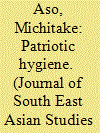

|
|
|
|
|
| Publication |
2013.
|
| Summary/Abstract |
This article examines knowledge production about malaria in colonial and postcolonial Vietnam. During the 1920s and 1930s, medical doctors cooperated with plantation managers in order to develop industrial hygiene techniques consisting of environmental modification and quinine use. By the 1930s, changing motivations, in particular racial hygiene and patriotism, drove malaria control efforts. The wartime pressures to control malaria between the 1940s and 1975 further encouraged patriotic hygiene. This history of malaria science in Vietnam highlights the tension between change and continuity and shows the importance of place in the conjunction of scientific knowledge production and nation-building projects.
|
|
|
|
|
|
|
|
|
|
|
|
|
|
|
|
| 5 |
ID:
124295
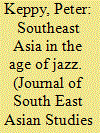

|
|
|
|
|
| Publication |
2013.
|
| Summary/Abstract |
Referencing insights from Cultural Studies and taking a jazz-age perspective, this essay aims to historicise and 'locate the popular' in colonial Indonesia and the Philippines. A new cultural era dawned in the 1920s urban hubs of Southeast Asia, associated with the creation of novel forms of vernacular literature, theatre, music and their consumption via the print press, gramophone, radio broadcasting and cinema. By investigating the complex relationship between the elusive phenomena of modernity, cosmopolitanism and nationalism as articulated by two pioneering artists active in commercial music and theatre, the social significance of popular culture is scrutinised.
|
|
|
|
|
|
|
|
|
|
|
|
|
|
|
|
| 6 |
ID:
124291
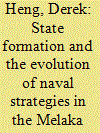

|
|
|
|
|
| Publication |
2013.
|
| Summary/Abstract |
The Strait of Melaka and connected waterways have been critical to, and directly affected, the formation of littoral states, societies and economies in eastern Sumatra, the Riau Islands, the Malay Peninsula, and Singapore. The history and nature of statehood in the region is interrelated to the way in which naval capabilities evolved, but, as argued in this article, perhaps not in the straightforward fashion often assumed. Naval capabilities and strategies evolved in tandem with state policy to adapt to changes in the wider Asian maritime political economy which was dominated at various times by China and India. This article examines the factors that affected maritime policy in the Melaka Straits c. 500 to 1500 CE, and the extent to which these furthered the viability of the mainly Malay port-polities, and in particular the regional hegemonic state of Srivijaya in eastern Sumatra. The study utilises textual records, epigraphic materials, and literature to reconstruct a more nuanced picture of maritime states and naval power in premodern Southeast Asia.
|
|
|
|
|
|
|
|
|
|
|
|
|
|
|
|
| 7 |
ID:
124299
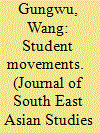

|
|
|
|
|
| Publication |
2013.
|
| Summary/Abstract |
For the past three decades, student movements in most countries in the world have been beaten back, but there are signs that some may be returning. In response to the Arab Spring, students participated fully in Tahrir Square and beyond. The student elections in Egypt that followed, however, seem to have been divided according to the various links that each student group had with the political groups contending for state power, like the Muslim Brotherhood and other Islamists on the one side, against secular and revolutionary groups on the other. It is not certain if the student elections really reflected the overall mood of the country or whether they were simply shaped by political protagonists outside the campuses.
|
|
|
|
|
|
|
|
|
|
|
|
|
|
|
|
|
|
|
|
|